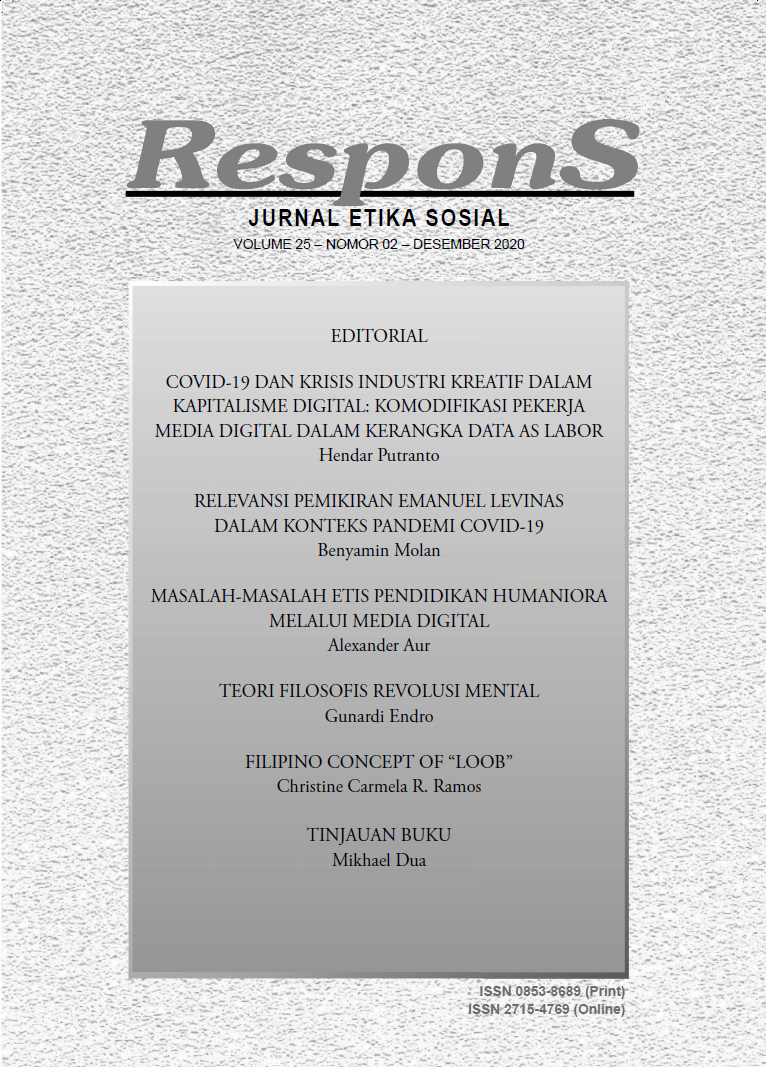Ethical Issues of Humanities Education Through Digital Media
DOI:
https://doi.org/10.25170/respons.v25i02.2465Keywords:
Humanities education, ontology of digital technology, digital culture, multidimensional of digital human beingAbstract
Humanities education - as a way for educators and students to develop dimensions of the human self to be more human - is facing a serious ethical challenge. The challenge in question is regarding the ontological status of digital media. The philosopher Martin Heidegger said that technology is the mode and moment of alētheia, that is, being reveals itself. Being reveals himself, that is the truth. When humans use technological tools, that is the moment and the way humans understand and embrace the truth. That's the technological ontology. Referring to the technological ontology, there are ethical problems faced by educators and students in the context of humanities learning through digital media. First, educators and students strive for an ontology of digital technology so that together with the use of digital technology, ethical truth and goodness reveal themselves. Second, educators and students open themselves to the truth and ethical virtues that reveal themselves during online humanities learning. Thus, educators and students remain ethical and human beings in the digital age.
References
Budi Hardiman, F, 2016, Heidegger dan Mistik Keseharian, Jakarta, Kepustakaan Populer Gramedia.
Gere, Charlie, Digital Culture, 2008, Great Sutton Street Ltd 33 London, Reaktion Books.
Heidegger, Martin, 1996, Being and Time (dalam kerangka penulisan ini, penulis menggunakan edisi terjemahan berbahasa Inggris dari karya asli Martin Heidegger Zein und Seit. Edisi berbahasa Inggris dari Zein und Seit dikerjakan oleh Joan Stambaugh), New York, State University of New York.
Kleden, Ignas dan Taufik Abdullah (Ed.), 2017, Paradigma Ilmu Pengetahuan dan Penelitian Ilmu-ilmu Sosial dan Humaniora di Indonesia, Jakarta, LIPI Press.
Martin Heidegger, 1978, Basic Writings from Being and Time (1927) to The Task of Thinking (1964), London and Henley, Routledge & Kegan Paul.
Lim, Francis, 2008, Filsafat Teknologi – Don Ihde tentang Dunia, Manusia, dan Alat, Yogyakarta, Kanisius.
Miriam Joseph, Sister, 2002, The Trivium: The Liberal Arts of Logic, Grammar, and Rhetoric – Understanding the Nature and Function of Language, Philadelphia, Paul Dry Books.
Polt, Richard & Gregory Fried (Ed.), 2001, A Companion to Heidegger’s Introduction to Metaphysics, New Haven/London, Yale University Press.
Rosenthal-Pubul, Alexander S., 2018, The Theoretic Life A Classical Ideal and its Modern Fate – Reflection on The Liberal Arts, Washington DC, Springer.
Sastrapratedja, SJ., M, 2013, Pendidikan sebagai Humanisasi, Jakarta-Yogyakarta, Pusat Kajian Filsafat dan Pancasila-SDU Press.
Sudibbyo, Agus, 2019, Jagad Digital-Pembebasan dan Penguasaan, Jakarta, KPG.
Skinner, Chris, 2019, Manusia Digital-Revolusi 4.0 Melibatkan Semua Orang, Jakarta, Elex Media Komputindo.
Tubbs, Nigel, 2014, Philosophy and Modern Liberal Arts Education, New York, Palgrave Macmillan.








